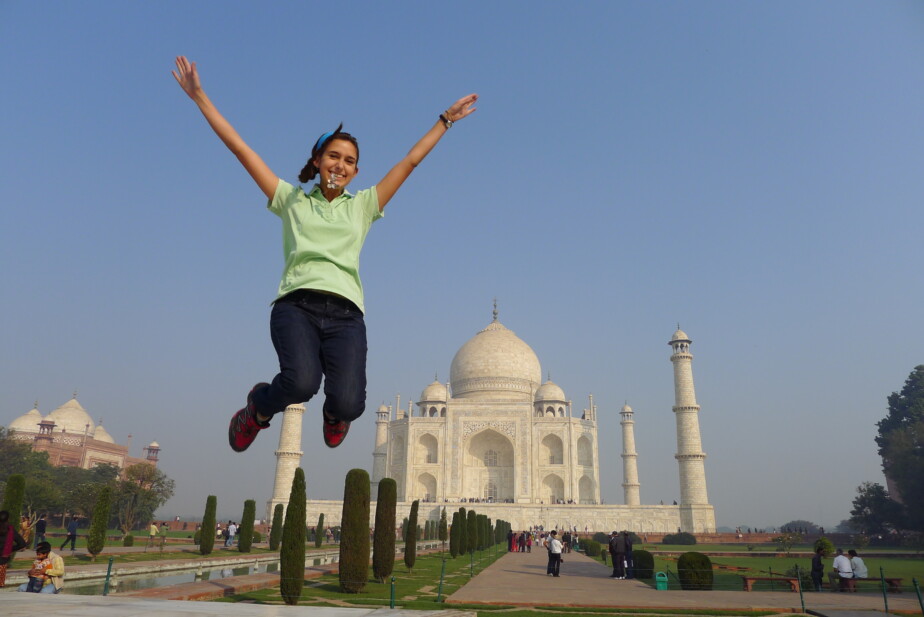GGYF Testimonials

“My gap year inspired me to continue volunteering on campus as a Bonner Leader during my first two years of college. I also was a minimum time AmericCorp member last year, working on building youth literacy skills. I actually have taken a semester off volunteering and I feel like something is missing in my life. There is something about serving another community that gives you a higher purpose to being here. That is something that I learned from my gap year.”
Amy, GGYF Fellow
“When I brought it up to my parents, they were confused and a little worried. After every conversation, they would still ask, ‘but why?’ I gave up at giving them explanations and merely said, ‘why not?’ I like adventure, challenge, and accepting opportunities that present themselves. When I return and join my Tar Heel family, I know I will be a different person, but different for the better. I will have a more global mindset; my world will have expanded and won’t just consist of my hometown, friends, and family. I will be ready to take on the challenges of college, knowing that after what I have been through, there will be nothing that I can’t try.”
Ceceila, GGYF Fellow
“I definitely feel supported. I know that if I need some help, it’s just an email away. Even when it comes to decisions I have to make concerning my Gap Year I know I can get advice from not only the people at the Campus Y and GAPPL, but the other Gap Year Fellows. I’ll definitely bring back a better understanding of world cultures and a sense of maturity and ability to take care of myself that I would have been missing had I not taken my Gap Year.”
Brad, GGYF Fellow
“One of the greatest challenges I faced during my gap year was establishing a sense of identity. I had gone into the experience feeling as if I didn’t have the right to speak out against things or to speak up about what I value, being a “stranger” in new spaces, and over the course of the first half of my gap year, I began to feel more and more frustrated with not knowing what I was entitled to say and how I was entitled to behave – in other words, who I was entitled to be. But eventually, I started to see how fundamentally similar life is across so many of these barriers. And at that point, I began to realize how fundamentally similar I was to all the people around me – something that’s often overlooked, undervalued, in globally-minded spaces, as we try to cultivate open minds and sensitivity – and was able to gain a sense, not quite the same person I knew before, but one who was more informed and certainly more comfortable engaging those spaces and the people inhabiting them.”
Michael, GGYF Fellow
“La Karin sí sabe la cultura Kichwa.” My host mother used to say this about me after I had lived in Alto Tena for a few months. “Carrie knows Kichwa culture.” Though a flattering exaggeration, things that had once felt overwhelming and foreign to me did become mundane and normal: catching fish with my hands, going to bed at 7pm, being the community gringa, clearing land with a machete, walking 40 minutes to the bus stop, greeting community members with a limp hand squeeze, cutting beef with a spoon, using “uh-uh” as the English equivalent of “mmhmm,” having eleven siblings, bathing in the river, trekking through the jungle, slapping my wet clothes against stones to rid them of stains, eating predominately carbs, pointing with my lips, drinking buckets of chicha, carrying babies, harvesting cacao, wading across rivers, bidding my host family goodnight in Kichwa. When aspects of my native Chapel Hillian culture began to feel twisted and foreign, I knew that I had accomplished something.”
Carrie, GGYF Fellow
“Attempts to learn a new language had tangible consequences in Brazil. If I didn’t know the word for rice, I certainly wasn’t going to get to eat it. If I didn’t know the word for bus, I certainly wasn’t going to get home. If I didn’t know the word for bank, I certainly wasn’t going to find one. Not knowing portuguese reduced complex thought. For months, I could only express basic ideas. I could no longer ask someone about a recent change in their life, but instead had to settle for asking how they were doing. For a time, I lost my personality. I couldn’t make jokes or get angry at anyone; social situations became self-degrading as I could barely communicate my tumultuous emotions. Learning portuguese came in humbling steps. I became willing to put in the hours with a textbook and translation dictionary in my room. I learned to try and fail to meet strangers over and over. I practiced patience with myself after forgetting phrases day after day. I learned to rely heavily on my body language and never forgot to bring scratch paper to draw on. The morning after I dreamt in portuguese for the first time, I called my portuguese teacher, practically crying. Progress doesn’t always come softly.”
Kristen, GGYF Fellow
“The financial aspect of the Fellowship allowed me to travel more and farther than I would have been able to afford on my own. The global service aspect is also something that changed my Gap Year plans. The Fellowship has given me an extra push to focus my travels and Gap Year on serving the world and looking for ways to be a productive global citizen. I went to Spain not knowing a single soul, and I left with a travel journal full of contacts not only in Spain but also throughout the rest of the world. While I was not necessarily shy to start with, traveling alone really forces you to put yourself out there, in a safe way, for people to get to know and trust and create a relationship with.”
Lily, GGYF Fellow
“The Global Gap Year Fellowship has given me a huge perspective and a very rich pool of experience to draw on when I’m connecting ideas and events I learn about in my classes. Because I now conduct research through the Department of Anthropology, it is incredibly useful to speak another language and have some (still limited!) understanding of the world outside the US.”
Brady, GGYF Fellow
“When I was working at a school in Musanze, Rwanda the headmaster gave me the task of creating after school activities for the children who stayed there until the last bus came in the evening. In addition to teaching them games and learning new games from them, I asked the school whether they thought that an afterschool tutoring homework would reduce the amount of kids who struggled to do their homework at home. They agreed that that would be a valuable program and so in collaboration with all the teachers we began to hold daily tutoring sessions for first through sixth graders after school.”
Elsa, GGYF Fellow
“My gap year confirmed my desire to be a nurse and work in public health by exposing me to real-world clinical settings. This hands-on experience has been invaluable–it has allowed me to stay on track with classes and be assured that I am taking the classes for the right reasons.”
Leah, GGYF Fellow
“My gap year encouraged me to major in Chinese, a language in which I previously had no experience. It also encouraged me to minor in German, which I had studied in high school. However, before my gap year I did not plan to continue studying German because I did not feel confident in my abilities. My gap year also gave me a frame of reference for many of my classes in asian studies, geography, and political science.”
Maggie, GGYF Fellow
“I am pleased that there is a service aspect to the Fellowship. This fits in well with the culture of our family, and I know she will benefit from seeing how others live and experiencing the joy of service. I hope this time off will allow my daughter to refocus on her academics and have more of an idea of how her education can give her both greater choice in her career path but also greater responsibility; I hope that it will give her more of a world perspective.”
“My son is learning to be self-sufficient (although he’s already pretty independent) and to appreciate cultures that are different from his own. He is picking up ideas for how to make this world a better place, and my hope is that he will pull all of these things together as he begins to think more in-depth about how he can better serve our world, and through which channels. For sure, the life skills, problem solving, resourcefulness and appreciation for others that he is developing while he’s away will put him at an advantage. “
“The gap year helped my son obtain tremendous self confidence and respect for people who are unlike himself. Many high school students are influenced by the masses and tend to exist as groups rather than as individuals. Much of how they live is determined by what others are doing and thinking. Again, being alone and traveling several places in the world, he was forced to adapt to several cultures and societies. He had to be more outgoing in order to obtain the basics to survive. That in turn taught him patience and humility. The materialism displayed by many americans was greatly magnified and he now understands what is really important in life. I do not believe his maturity level would be anywhere near where it is now. The gap year really put life into perspective.”
“[The Gap Year] has helped [my daughter]. She’s more concentrated on her studies.”
